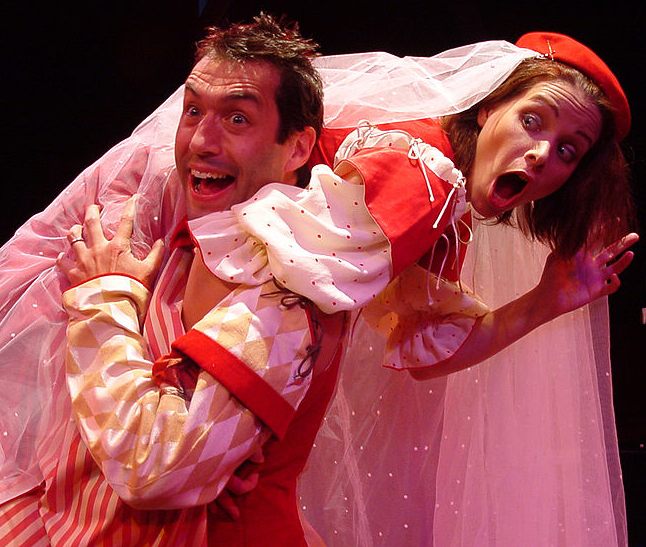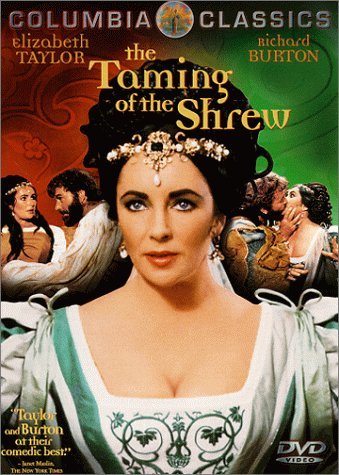|
The Taming of the Shrew is a comedy by
William
Shakespeare, believed to have been written between 1590 and 1591.

The play begins with a framing device, often referred to as the Induction, in which a mischievous nobleman tricks a drunken tinker named Sly into believing he is actually a nobleman himself. The nobleman then has the play performed for Sly's diversion.
The main plot depicts the courtship of Petruchio, a gentleman of Verona, and Katherina, the headstrong, obdurate shrew. Initially, Katherina is an unwilling participant in the relationship, but Petruchio tempers her with various psychological tormentsthe "taming"until she becomes a compliant and obedient bride. The subplot features a competition between the suitors of Katherina's more desirable sister,
Bianca.
The play's apparent misogynistic elements have become the subject of considerable controversy, particularly among modern audiences and readers. It has nevertheless been adapted numerous times for stage, screen, opera, and musical theatre; perhaps the most famous adaptations being Cole Porter's musical
Kiss Me, Kate and the 1967 film version of the original play, starring
Elizabeth Taylor and Richard Burton. The film 10 Things I Hate About You is also loosely based on the play.
SYNOPSIS
Prior to the first act, an induction frames the play as a "kind of history" played in front of a befuddled drunkard named Christopher Sly who is tricked into believing that he is a lord.
In the play performed for Sly, the "Shrew" is Katherina Minola, the eldest daughter of Baptista Minola, a lord in Padua. Katherina's temper is notorious and it is thought no man would ever wish to marry her. On the other hand, two men Hortensio and Gremio are eager to marry her younger sister Bianca. However, Baptista has sworn not to allow his younger daughter to marry before Katherina is wed, much to the despair of her suitors, who agree that they will work together to marry off Katherina so that they will be free to compete for
Bianca.
The plot becomes more complex when Lucentio, who has recently come to Padua to attend university, sees Bianca and instantly falls in love with her. Lucentio overhears Baptista announce that he is on the lookout for tutors for his daughters, so he has his servant Tranio pretend to be him while he disguises himself as a Latin tutor named Cambio, so that he can woo Bianca behind Baptista's back.
In the meantime, Petruchio arrives in Padua, accompanied by his servant, Grumio. Petruchio tells his old friend Hortensio that he has set out to enjoy life after the death of his father and that his main goal is to wed. Hearing this, Hortensio seizes the opportunity to recruit Petruchio as a suitor for Katherina. He also has Petruchio present to Baptista a music tutor named Litio (Hortensio himself in disguise). Thus, Lucentio and Hortensio, pretending to be the teachers Cambio and Litio, attempt to woo Bianca unbeknownst to her father, and to one another.
Petruchio, to counter Katherina's shrewish nature, woos her with reverse psychology, pretending that every harsh thing she says or does is kind and gentle. Katherina allows herself to become engaged to Petruchio, and they are married in a farcical ceremony during which (amongst other things) he strikes the priest and drinks the communion wine, and then takes her home against her will. Once they are gone, Gremio and Tranio (disguised as Lucentio) formally bid for Bianca, with Tranio easily outbidding Gremio. However, in his zeal to win, he promises much more than the real Lucentio actually possesses, and Baptista determines that once Lucentio's father confirms the dowry, Bianca and Tranio can marry. Tranio thus decides that they will need someone to pretend to be Vincentio, Lucentio's father, at some point in the near future. Elsewhere, as part of their scheme, Tranio persuades Hortensio that Bianca is not worthy of his attentions, thus removing any problems he may cause.
Meanwhile, in Petruchio's house, he begins the "taming" of his new wife. She is refused food and clothing because nothing according to Petruchio is good enough for her; he claims perfectly cooked meat is overcooked, a beautiful dress doesn't fit right, and a stylish hat is not fashionable. He also sets about disagreeing with everything she says, and forcing her to agree with everything he says, no matter how absurd; on their way back to Padua to attend Bianca's wedding, she agrees with Petruchio that the sun is the moon, and proclaims that "if you please to call it a rush-candle,/Henceforth I vow it shall be so for me" (4.5.1415). Along the way, they meet Vincentio who is also on his way to Padua, and Katherina agrees with Petruchio when he declares that Vincentio is a woman and then apologises to Vincentio when Petruchio tells her he is a man.
Meanwhile, back in Padua, Lucentio and Tranio convince a passing pedant to pretend to be Vincentio and confirm the dowry for Bianca. The man does so, and Baptista is happy for Bianca to wed Lucentio (actually Tranio in disguise). Bianca then secretly elopes with the real Lucentio. However, Vincentio arrives in Padua, and encounters the Pedant, who claims to be Lucentio's father. Tranio (still disguised as Lucentio) appears, and the Pedant acknowledges him to be his son Lucentio. There is much confusion about identities, and the real Vincentio is set to be arrested when the real Lucentio appears with his newly betrothed Bianca, and reveals all to a bewildered Baptista and Vincentio. Lucentio explains everything that has happened and all is forgiven by the two fathers.
Meanwhile, Hortensio has married a rich widow, and so in the final scene of the play there are three newly married couples at Baptista's banquet; Bianca and Lucentio, the widow and Hortensio, and Katherina and Petruchio. Because of the general opinion that Petruchio is married to a shrew, a quarrel breaks out about whose wife is the most obedient. Petruchio proposes a wager whereby each will send a servant to call for their wives, and whichever comes most obediently will have won the wager for her husband. Katherina is the only one of the three who comes, winning the wager for Petruchio. At the end of the play, after the other two wives have been hauled into the room by Katherina, she gives a speech on the subject of why wives should always obey their husbands and the play ends with Baptista, Hortensio and Lucentio marvelling at how successfully Petruchio has tamed the shrew.

CAST
OF CHARACTERS
Katherina (Kate) Minola the "shrew" of the title
Bianca sister of Katherina; the ingιnue
Baptista Minola father of Katherina and Bianca
Petruchio suitor of Katherina
Gremio elderly suitor of Bianca
Lucentio suitor of Bianca (spends some of play disguised as Cambio, a Latin tutor)
Hortensio suitor of Bianca and friend to Petruchio (spends some of the play disguised as Litio, a music tutor)
Grumio servant of Petruchio
Tranio servant of Lucentio (spends some of the play disguised as Lucentio)
Biondello servant of Lucentio
Vincentio father of Lucentio
A Widow wooed by Hortensio
A Pedant pretends to be Vincentio
A Haberdasher
A Tailor
Curtis servant of Petruchio
Nathaniel servant of Petruchio
Joseph servant of Petruchio
Peter servant of Petruchio
Nicholas servant of Petruchio
Philip servant of Petruchio
An Officer
Servants
Characters appearing in the Induction:
Christopher Sly a drunken tinker
A Lord plays a prank on Sly
Bartholomew a page
Hostess of an alehouse
Huntsman of the Lord
Players
Servingmen
Messenger
|
Taming
of the Shrew
- Youtube
|
Trailer
ad - Youtube
|
|
Tribute
to Liz Taylor
- Youtube
|
BBC
Animation - Youtube
|
LINKS:
Smooth
Faced Gentlemen - An all female Troupe producing quality productions
of Shakespeare's plays.
Stratford
Upon Avon - Shakespeare's birthplace
Antony
and Cleopatra * Hamlet
* Macbeth * Othello * Romeo
and Juliet
A
Midsummer Night's Dream * As
You Like It * Much Ado About Nothing
The
Merchant of Venice * The Taming of the Shrew
Ashlea
* Camina
* Carly * Fran
* Henri * Kayleigh
* Leila * Mariam

A
feel good adventure:
Pirate
whalers V Conservationists
with
a $Billion dollars resting on the conclusion
|

